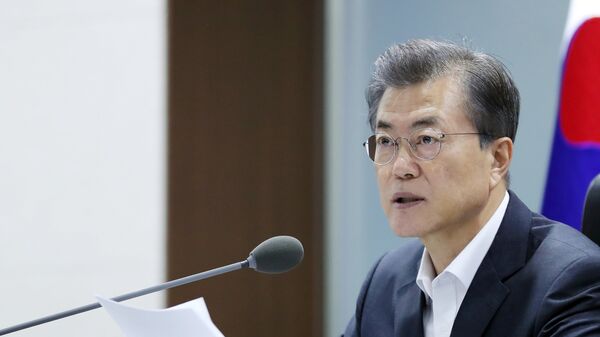Moon’s government has sought a record-high 513.5 trillion won ($438.7 billion) budget for 2020 - a 9.3% increase from this year, according to the Korea Herald. The spending is spread across industrial investment, programs for seniors and young adults, and most importantly, the military.
The Republic of Korea Armed Forces would see a 7% increase in their budget next year, an increase of 50 trillion won ($42 billion), AFP reported. A “strong defense,” Moon told lawmakers, was crucial for “self-determination.”
"We will strengthen the core defense system by boosting assets such as next-generation submarines and surveillance satellites,” Moon said. The country has already begun a massive naval expansion, including building new missile destroyers, ballistic missile submarines and helicopter carriers. Seoul will also buy 20 more F-35 stealth aircraft from Washington.
However, Seoul also bears part of the burden for supporting US Forces Korea, a 28,500-strong force that has garrisoned in the country since the 1950-53 Korean War, when the US and South Korean forces fought the North’s Korean People’s Army and its Chinese and Soviet allies. Students scaled the walls of the US ambassador’s residence in Seoul last week to protest the steep increase in cost burden for South Korea, which US President Donald Trump pushed up to $923 million next year.
No formal peace treaty ended the conflict, just a ceasefire that established the demilitarized zone. The ensuing standoff has seen a dramatic military buildup, including the development of nuclear weapons by Pyongyang and the hosting of war games by the US and South Korea that rehearse deep strikes on the North.
Negotiations to denuclearize the Korean Peninsula stalled in February, and despite attempts to revive them, the most recent of which was earlier this month, the talks have not renewed. However, Moon and North Korean leader Kim Jong Un succeeded in signing an end-of-war declaration in September 2018 that marked the acme of rapprochement between the Two Koreas.
The budget hikes are key to plugging holes in the country’s steadily slowing economy and fending off the dreaded last resort of cash-strapped nations: a loan from the International Monetary Fund. The IMF advised Seoul to ramp up state investment as a “breakwater,” the Korea Herald noted.
Concurrent with the defense budget increases are plans by the South Korean military to cut its numbers by one-third over the next few years, in recognition of a decreasing birth rate and conscription-age demographic, Sputnik reported.
“Public finances must lead the way to resolve structural problems of our society such as low growth, [economic] polarization, jobs, low birth rates and the aging population,” Moon said, noting his ultimate goal of an “innovative, inclusive, fair and peaceful economy” as the key to social prosperity.
Moon referred to these and related challenges as part of a “severe situation” when combined with the economic crisis, Yonhap News Agency noted.
“The global economy is worsening rapidly due to trade dispute between the United States and China and increased trade protectionism” by the world’s major economies, Moon told lawmakers. South Korea ranks as Asia’s fourth-largest economy, with a GDP of $1.7 trillion in 2018, according to data from the Organisation for Economic Co-operation and Development (OECD). Its GDP growth is forecast at a slow 2% next year. However, the population is expected to shrink slightly, by 0.4%, due in part to the country’s abysmally low birth rate.
Despite the increases, the government debt ratio would not exceed 40% of total GDP, the Seoul-based Pulse News reported. However, a slowing economy has meant shrinking tax revenue, and so of the proposed 2020 spending, a maximum of 26 trillion won will be raised through debt issues, the outlet noted.
The special committee’s budget adjustment subcommittee will begin deliberating over the budget on November 11, and the National Assembly must approve the 2020 budget by December 2.




